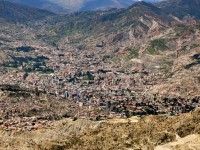A new working paper published by the Lincoln Institute for Land Policy explores land use planning responses to climate change-driven water shortages in El Alto, Bolivia, the sister city of La Paz. The largest high-altitude city in the world, El Alto depends on water from alpine glaciers that are quickly receding with warmer temperatures. Already one of the fastest growing cities in Latin America, El Alto will continue to expand rapidly as declining water supply in rural areas drives urban migration. Its high incidence of poverty and contentious politics further challenge effective policy responses. Using a hydrological model that points to the city’s vulnerability to dwindling water reserves and drawing on interviews with local stakeholders, the paper demonstrates how land use planning is an important and currently overlooked strategy to promoting sustainable access to water in arid cities. Raising local urban planning and management capacity can generate economic and environmental co-benefits, including denser, more vibrant and better distributed city centers; reduced costs of extending and maintaining water infrastructure; and new opportunities to insert water recycling, rainwater collection, and other drought resilient technologies. The paper was co-authored by Linda Shi and James Kostaras from I2UD, and Marisa Escobar and Brian Joyce from the Stockholm Environment Institute.
Read the paper: English | Español
Field Notes from Bolivia here
Project Page here

